
Haji Abid Ghoffar bin Aboe Dja’far or better known as Ebiet G. Ade is an Indonesian singer-songwriter and guitarist of Javanese descent.
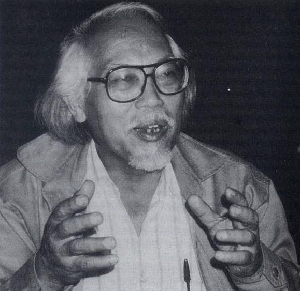
Yusuf Bilyarta Mangunwijaya, was an Indonesian architect, writer, and Catholic religious leader. He was popularly known as Romo Mangun.
Ahmadun Yosi Herfanda, is an Indonesian journalist and poet. His name is also written as Ahmadun YH, Ahmadun Y. Herfanda, Ahmadun Herfanda, or AYH (ayeha). Ahmadun's poetry focuses on social and religious themes and is informed by Sufism. He is a reporter and arts editor at the daily newspaper Republika. Now he is known as a famous Indonesian poet and writer.
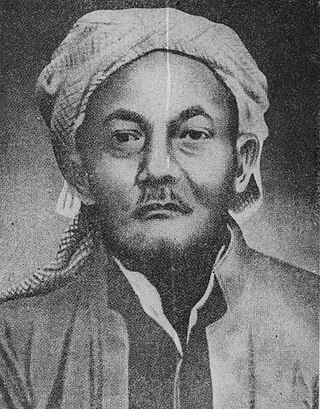
Kyai Haji Hasyim Asy'ari was an Indonesian ulama, National Hero and founder of Nahdlatul Ulama.

Sitor Situmorang was an Indonesian poet, essayist and writer of short stories. Situmorang was born in Harianboho, North Sumatra, and educated in Jakarta. He worked as a journalist and literary critic in Medan, Yogyakarta and Jakarta for a variety of newspapers and periodicals.

Afrizal Malna, is an Indonesian activist, writer of prose, poetry, and theatrical texts.

Endang Turmudi is a sociologist and Research Professor from Indonesia. He is a senior researcher at the Indonesian Institute of Sciences (LIPI) in Jakarta and was head for its Society and Culture Research Center (PPKK). Turmudi was inaugurated as LIPI's 114th research professor in December 2014, with research specialization in sociology.

Hans Bague Jassin, better known as HB Jassin, was an Indonesian literary critic, documentarian, and professor. Born in Gorontalo to a bibliophilic petroleum company employee, Jassin began reading while still in elementary school, later writing published reviews before finishing high school. After a while working in the Gorontalo regent's office, he moved to Jakarta where he worked at the state publisher Balai Pustaka. After leaving the publisher, he attended the University of Indonesia and later Yale. Returning to Indonesia to be a teacher, he also headed Sastra magazine. Horison, a literary magazine, was started in July 1966 by Jassin and Mochtar Lubis as a successor to Sastra, and was edited by Taufiq Ismail, Ds. Muljanto, Zaini, Su Hok Djin, and Goenawan Mohamad. In 1971, Jassin was given a one-year prison sentence and a two-year probation period because as the editor of Sastra, he refused to reveal the identity of an anonymous writer who wrote a story which was considered by the court to be blasphemous.

Ajip Rosidi was an Indonesian poet and short story writer. As of 1983 he had published 326 works in 22 different magazines.

Christophorus Apolinaris Eka Budianta Martoredjo, also known as C. A. Eka Budianta, more commonly known as Eka Budianta is an Indonesian poet. He was born into a Catholic family and was the second child of nine. His grandparents were farmers. His parents were public elementary school teachers; his father later worked at the local office for the Ministry Education and his mother became a school principal. After graduating from St. Albertus high school in Malang (Dempo), he attended the Lembaga Pendidikan Kesenian Jakarta, now known as Institut Kesenian Jakarta, but did not complete his studies. From 1975 to 1979, Eka Budianta studied Japanese literature at the Department of East Asian Studies Literature; he then moved to the Department of History at the University of Indonesia. He subsequently studied journalism at Los Angeles Trade-Technical College in the United States from 1980–81. He also worked as a reporter for Tempo weekly newsmagazine and the Japanese newspaper Yomiuri Shimbun.
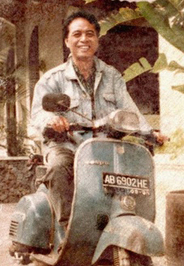
Linus Suryadi Agustinus, commonly known Linus Suryadi AG or Linus Suryadi AGN was born in Sleman, Indonesia on 3 March 1951 and died in Yogyakarta on 30 July 1999 at the age of 48.
Akhudiat was an Indonesian poet, playwright, and humanist.
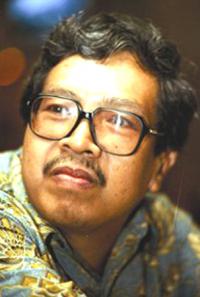
Kuntowijoyo was an Indonesian writer and academic.
Putu Oka Sukanta is a versatile Indonesian author of fiction and poetry. He wrote poetry, short stories and novels while still in Bali and after he moved to Yogyakarta and Jakarta. From 1966, during the New Order, he was imprisoned without trial as an alleged member of LEKRA. After his release in 1976, he has come to be known as a writer, journalist and an expert in the field of traditional medicine.
Darmanto Jatman was an Indonesian poet and writer. He was an Emeritus Professor at the Faculty of Psychology, Diponegoro University (UNDIP), Semarang. He was known as a humanist, philosopher and poet of Indonesia. He gave birth to the establishment of the Faculty of Psychology at UNDIP and became the first professor in the faculty. On 27 July 2007, Susilo Wibowo of UNDIP gave him the title of Professor, exactly a month before he retired, so that he was immediately given the title of Emeritus Professor.
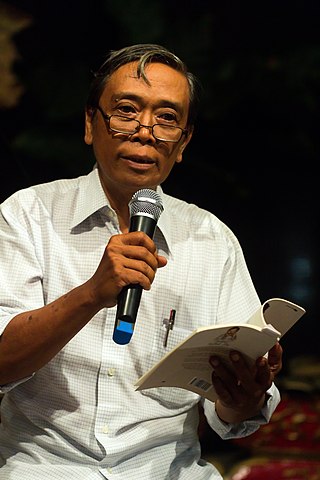
Iman Budhi Santosa, commonly known as IBS, was an Indonesian author based in Yogyakarta. Born in Magetan, East Java, IBS was educated in agriculture but drawn to literature from a young age. In 1969, he helped establish the Persada Studi Klub, later publishing numerous works, including poetry collections, novels, and short stories. His poetry has been considered to have strong Javanese cultural influences.

Korrie Layun Rampan was an Indonesian novelist, short story writer, poet, literary critic, journalist, and politician.
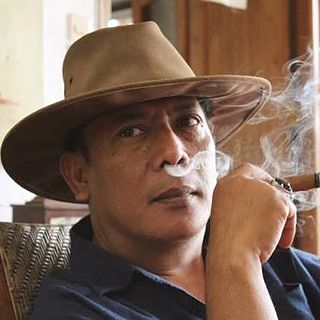
Sitok Srengenge is an Indonesian poet, actor, and dramatist. Born Sitok Sunarto in Purwodadi, Central Java, he became interested in literature at a young age and was heavily influenced by his village's strong oral tradition. When he moved to Jakarta to complete his university studies, he became involved with the Bengkel Teater under Rendra. Sitok remained with the company for almost a decade, appearing in several plays as he refined his literary style. His first poetry collection, Persetubuhan Liar, was published in 1992.

Diah Hadaning was an Indonesian writer. Among friends she is known as Diha.

Dimas Arika Mihardja was an Indonesian poet and scholar, essayist. He wrote under a pseudonym, the real name is Sudaryono. Among friends he was called as Dam.

















